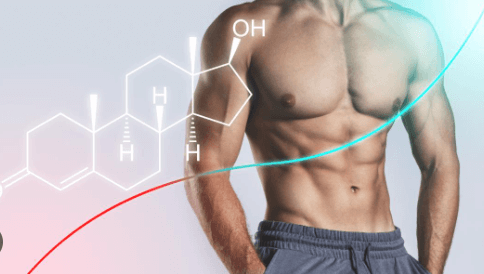The Role of Hormones in Muscle Building and Fat Loss

Beyond anything else in the process of achieving one’s fitness objectives, which may include gaining muscles, losing fats, or both, hormones play an incredibly critical role. First, hormones can be described as chemical substances that are secreted in the body and which are responsible for the control of metabolic activity, enhancement of growth as well as the conservation of energy. It is necessary to mention the function of hormones concerning muscle mass gain and fat loss so that to improve the outcomes corresponding to the set fitness program. This article provides an insight into the most important hormones affecting such processes, the impact that they have on your shape and size, and the tips pointing to how you can naturally boost your hormones for better muscles build and fats shedding.
The Anabolic Hormones: Foundation Types of Overload
Muscle gained, or hypertrophy, depends upon anabolic hormones those hormones which are useful for the growth and repairing of the tissues. The best known anabolic hormones are those of androgenic –pharmaqo dianabol, somatotropic – growth hormone (GH) and insulin like growth factor 1 (IGF-1). These hormones have extra importance in the synthesis of proteins, muscles, and tissues, and are vital in the process of muscles gains or build up.
There also exists the need for testosterone – the ‘muscle-building hormone’ – will be necessary regardless of the sex but it is actually formed in a higher percentage of the male beings. Some of the benefits that support the consumption of this supplement Pharmaqo Tri Test include; it builds muscle protein, improves muscle strength and accelerates recovery periods from exercises. Testosterone like other hormones in the body fluctuates depending on age, or other issues such as diet and exercise, or even genetic factors. Aerobic exercise raises testosterone level, specifically lifting compound exercises such as squat and dead lifts are useful in increasing testosterone and thus are central to any muscle gains program.
Another vital hormone in muscle enlargement is the Growth Hormone (GH). That provokes secretion of IGF-1 from the liver which is known to be a direct marker of muscle mass increase and suppression of protein degradation. They also participate in the regulation of fat metabolism, thus making GH a two in one hormone for those that desire fat loss while at the same time increasing muscle mass. Growth hormone concentration reaches its highest levels in the night hence stressing the significance of sleep in muscles growth and repair. Some natural ways of increasing the level of GH are such activities as HIIT and proper amount of deep sleep.
Insulin-Like Growth Factor 1 (IGF-1) works in tandem with GH to promote muscle hypertrophy. It enhances protein synthesis and promotes the uptake of amino acids into muscle cells. IGF-1 levels can be influenced by diet, exercise, and overall hormonal balance. For example, consuming a diet rich in protein and healthy fats can help maintain optimal levels of IGF-1.
The Role of Insulin in Muscle Growth and Fat Storage
Insulin which is a hormone made by the pancreas has a role in building muscle superbolan 400 and storing fat. Notably, most people have a wrong impression of this hormone, which is not only a fat-storing hormone as most people have a perception of but also an anabolic agent as indicated by the above implication implying that insulin can promote muscle development, albeit not under normal conditions. Carbohydrates raise the blood sugar levels and that triggers the release of insulin into the bloodstream. Insulin then act as a transport medium to move glucose into the cells for either utilization or conversion to glycogen in muscle and liver cells.
Insulin’s Role in Muscle Growth: The last meal should be taken and consumed immediately after a workout most especially when the muscle mass is most receptive to nutrient absorption. The rise in insulin levels due to carbohydrates assists in loading amino acids in the muscle tissues for intensifying protein synthesis and yielding. This procedure also helps in emphasizing the necessity of nutrient intake after working out.
Insulin and Fat Storage: Insulin is used to stimulate the muscles growth but on the same note it also facilitates the putting on of fats when consumed in large proportions. This is because, besides lowering the blood glucose levels, insulin also stimulates the conversion of any remaining glucose in the blood into fat and stored in adipose tissue. To emphasize the anabolic effects of insulin on muscles and vice versa – reduce the deposit of fat tissue, it is necessary to focus on the timing and type of carbohydrates. Complex carbohydrates take a longer time to be digested and thus do not cause a large spikes in insulin levels and are thus ideal for using in preparation of foods for owning a lean body.
Cortisol: How Stress Hormone Affect The Muscle And The Fat
Cortisol is commonly known as the stress hormone and this is produced mainly in the adrenal gland when one is experiencing stress – be it the physical or the emotional type. Cortisol, as earlier established, plays many roles in the body; however, when it is present in high amount in the body for a long time, it becomes counterproductive as it interferes with muscle growth as well as fat loss. It is possible to see that cortisol is one of the hormones whose role can be critical for fitness results; thus, understanding its role and ways to influence it can be important.
Find most undetectable draftHumanize moreCheck for AI
Increased cortisol has catabolic properties hence if the level is high, it results to muscle breakdown. This is due to the fact that cortisol increases the rate of muscle proteolysis to supply amino acids for gluconeogenic synthesis which is in a bid to generate glucose for energy production. Here, not adhering to proper nutrition can also be incredibly destructive to the objectives of fitness since it slows down the process through which muscles are built. Stress can be effectively managed through approaches such as mindfulness, sufficient sleep and proper diet to ensure that the levels of cortisol, a stress hormone are controlled.
Cortisol and Fat Storage: High cortisol levels also contribute to rapid fat deposition particularly around the waist. Thus, this fat is known as visceral fat, and it is not only dangerous for the looks but also the health of the person. Somehow, cortisol can be managed through a proper exercise since it affects the body’s stress response mechanism and a well-balanced diet containing fruits, vegetables, and lean meat products.
Hormonal balance for gaining muscles and for losing fats Dabei:
Balancing hormones is very crucial in attaining the best results of building muscle and burning fat at the same time. Of course, there are also hereditary factors in terms of hormone concentrations, but the diet, physical activity, number of hours slept, and the way stress is coped with are also highly important. Here are some strategies to optimise your hormonal profile for better fitness results:Below are some of the guidelines that can help you to get your hormonal balance rightly to enable proper fitness:
1. Balanced Diet: A diet of such foods benefit the body because they are rich in proteins but low in fats while the carbohydrates that are incorporated in the foods are complex and assist in hormone synthesis and regulation. Micronutrients that are important to healthy testosterone levels include; vitamin D, zinc and omega-3 fatty acid.
2. Regular Exercise: Strength training as well as cardiovascular exercise training has some postitive effects on hormones. Cardio will perform the function of moderating the detrimental effects of cortisol levels on the anabolic hormones that include testosterone and GH which rise during the course of resistance training.
3. Adequate Sleep: Aim at getting a healthy quality of sleep as this assist in the secretion of the hormones such as the GH and the cortisol. In this regard, it is desirable to guarantee oneself to sleep well and have 7-9 hours’ undisturbed sleep so that muscles can regenerate.
4. Stress Management: Therefore, chronic stress leads to elevated cortisol levels which similarly have an impact of halting the development of muscles as well as contributing to fattening of the body. In this case, it may require to develop approaches to the cortisol decrease, for instance, adding such activities as meditation, yoga, or deep breathing exercises to the daily schedule.
Conclusion: Intra FEST REVIEW PT2: The Hormonal Blueprint for Fitness Success
It is well understood that hormones are involved in the process of metabolism and energy use and also in the shaping of muscle and fat tissues. A proper knowledge of hormones that play a critical role in muscles ‘anabolism’, and particularly testosterone, growth hormone, IGF-1, insulin and cortisol, would enable one to fine-tune fitness regimen. That is why, following the guidelines on the proportioned diet, a reasonable level of physical activity, sufficient sleep, and the ability to cope with stress, it will be possible to achieve hormonal conditions for training. To cut or bulk, regardless of your goal — hormone-friendly daily habits are your perfect road map.




